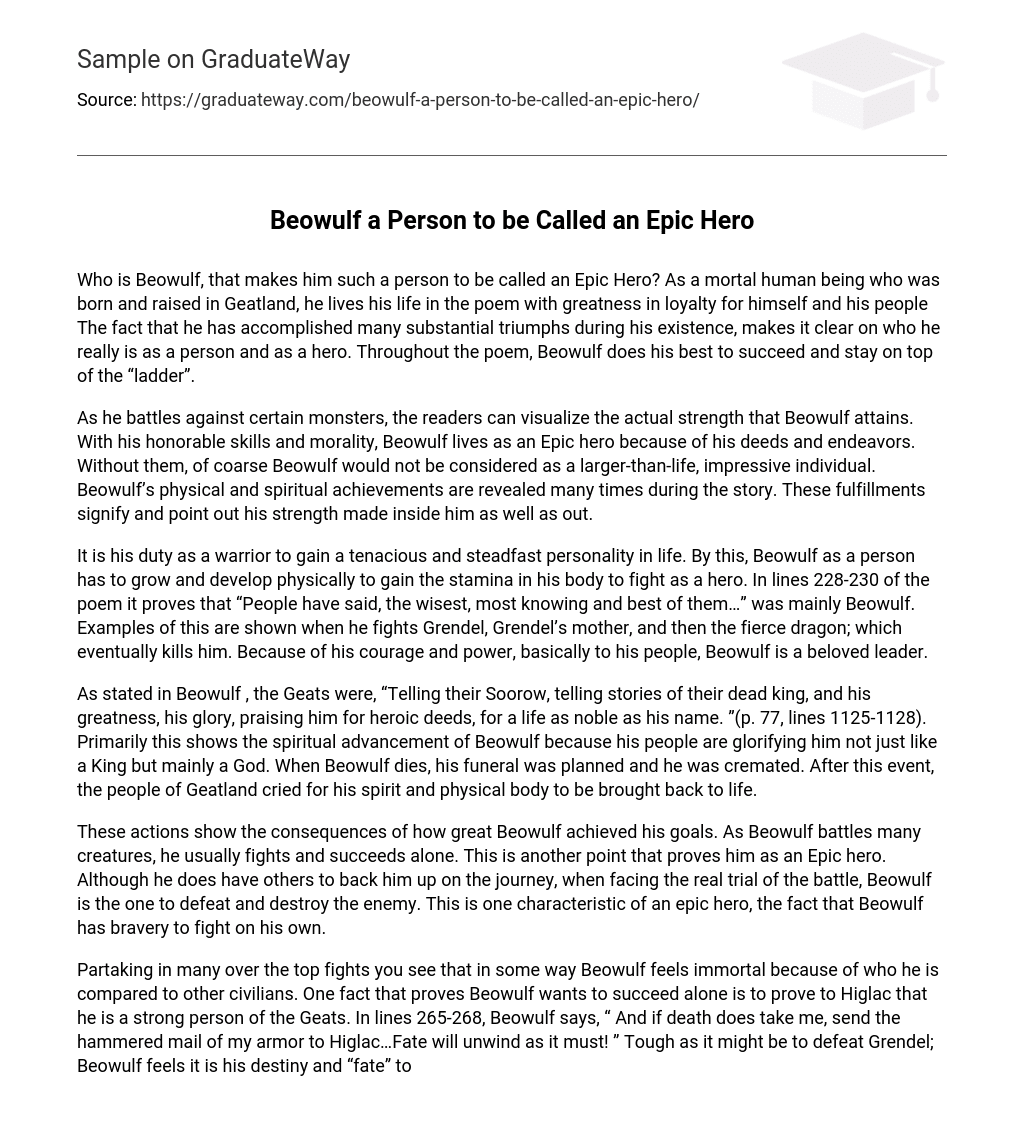Beowulf is a mortal human being from Geatland who is celebrated as an Epic Hero. In the poem, his life is marked by greatness and loyalty to himself and his people. Beowulf has accomplished many important victories, solidifying his identity as both a person and a hero. Within the poem, he consistently works hard to excel and remain at the top.
As Beowulf encounters different monsters, his true strength is revealed to readers. His honorable abilities and morality establish him as an epic hero, evident in his actions and endeavors. Without these traits, Beowulf would not be regarded as an exceptional and awe-inspiring person. The story consistently showcases Beowulf’s physical and spiritual achievements, emphasizing the inner and outer strength he possesses.
In order to fulfill his duty as a warrior, Beowulf must develop a resolute character and grow physically. This growth is necessary for him to acquire the strength needed to fight as a hero. The poem highlights this aspect in lines 228-230, where it states that “People have said, the wisest, most knowing and best of them…” primarily refers to Beowulf. His battles against Grendel, Grendel’s mother, and the formidable dragon showcase his bravery and power. Despite ultimately meeting his demise in the fight against the dragon, Beowulf is revered by his people as a beloved leader due to his courage and might.
Beowulf recounts that the Geats mourned and recounted tales of their deceased king, lauding his courageous actions and honorable existence (p. 77, lines 1125-1128). This emphasizes Beowulf’s spiritual advancement as his subjects venerate him not solely as a monarch but principally as a divine being. Following Beowulf’s demise, arrangements are made for his burial and he is cremated. Consequently, the inhabitants of Geatland grieve for both his soul and physical remains to be revived.
These actions demonstrate the outcomes of Beowulf’s remarkable achievements. Throughout his battles with various creatures, Beowulf consistently stands alone and triumphs. This further illustrates his status as an epic hero. While he does have companions accompanying him on his journey, Beowulf must confront and vanquish his enemies on his own. This emphasis on personal bravery is a key characteristic of an epic hero.
The text portrays Beowulf as feeling invincible due to his exceptional abilities compared to ordinary individuals, as evidenced by his participation in numerous intense battles. Beowulf’s desire to prove his strength to Higlac, a prominent figure among the Geats, is one indication that he wishes to succeed independently. In lines 265-268, Beowulf explicitly states, “And if death does take me, send the hammered mail of my armor to Higlac…Fate will unwind as it must!” Despite the immense challenge Grendel poses, Beowulf believes it is his predetermined fate to vanquish both Grendel and his mother without any assistance.
Beowulf is portrayed as an undistracted fighter who fearlessly battles villains to showcase his bravery and strength. Despite sustaining numerous injuries, Beowulf demonstrates his skills as an epic hero for the Geats. As he faces the dragon and accepts his imminent death, Beowulf acknowledges that he can depart with contentment knowing he has never harmed his own kin and that death will provide a peaceful release from the life and people he has governed for an extended period (Lines 963-973).
Beowulf contemplates his imminent death but takes pride in his achievements as a warrior. Throughout the epic poem, it becomes evident that Beowulf’s ultimate aspiration is to live as a hero. His joy and satisfaction defined his identity before his demise. Beowulf passed away with the assurance of having fulfilled his responsibilities to others and proving himself trustworthy. He expressed contentment, stating, “knowing he had completed his time on earth, experiencing everything God allowed him; all earthly pleasures vanished, just as life would soon” (p. 73 lines 946-951). Despite the absence of worldly pleasure in his final moments, Beowulf felt gratified and acknowledged his mortality.
And as a mortal, one requires emotions such as happiness, and it was with that feeling that Beowulf decided to chart his own course. He followed his instincts as a human and seized the opportunity to fulfill his dream of becoming an epic hero for everyone. Ultimately, the multitude of traits and characteristics possessed by Beowulf truly solidify his status as an epic hero. Beowulf showcases exceptional qualities such as strength, bravery, and helpfulness. Additionally, how he confronted his own mortality also contributes to his status as an epic hero. His fearlessness and refusal to resist his demise make him a heroic figure deserving of admiration.
This idea of heroism, prioritizing the lives of others over one’s own, was always present in Beowulf’s mind. He defended his homeland, safeguarding one civilian after another, in the days of the Anglo-Saxon era. Ultimately, Beowulf is deemed an epic hero due to his genuine values and willingness to prioritize others. Through these significant qualities, we learn that Beowulf can serve as a model for everyone, inspiring them to become brave individuals and potentially even ambitious heroes.





